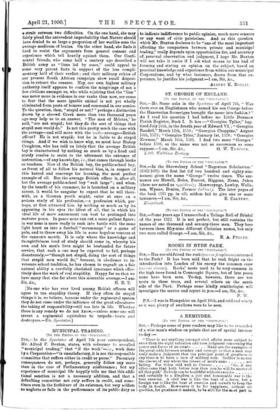MUNICIPAL TRADING.
(To THE EDITOR OF THE "SPECTATOR.") Sut,—In the Spectator of April 7th your correspondent, Mr. Alfred F. Buxton, states, with reference to so-called "municipal trading," that "if the work "—i.e., work done by a Corporation—" is unsatisfactory, it is not the responsible committee that suffers either in credit or purse." Pecuniary consequences do not, perhaps, generally follow any more than in the case of Parliamentary misfeasance; but my experience of municipal life happily tells me that this addi- tional sanction is not a necessary addition, and that a defaulting committee not only suffers in credit, and some- times even in the forfeiture of its existence, but very seldom so neglects or fails in the performance of its public duty as
to indicate indifference to public opinion, much more censure or any want of civic patriotism. And as this question which Mr. Buxton declares to be "one of the most important affecting the comparison between private and municipal trading," really depends upon opportunities for, and accuracy of, personal observation and judgment, I hope Mr. Buxton will not take it amiss if I ask what means he has had of forming and stating an opinion on the subject, based on practical knowledge and experience from within our municipal Corporations, and by what instances, drawn from that ex- perience, he justifies his judgment.—I am, Sir, &c.,
ALBERT K. ROLLIT.


































 Previous page
Previous page